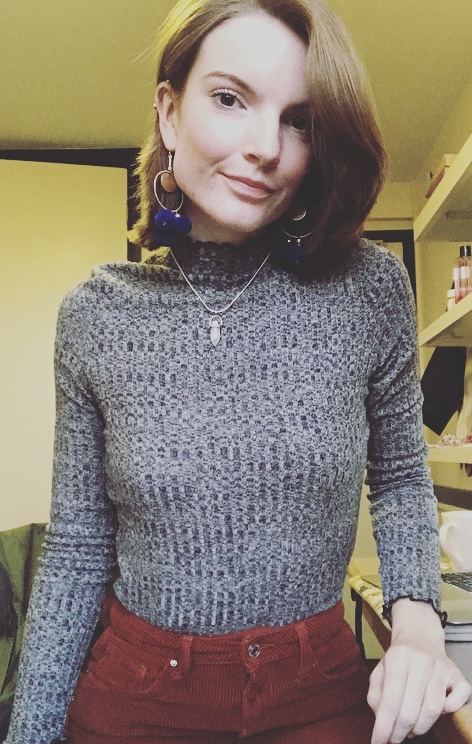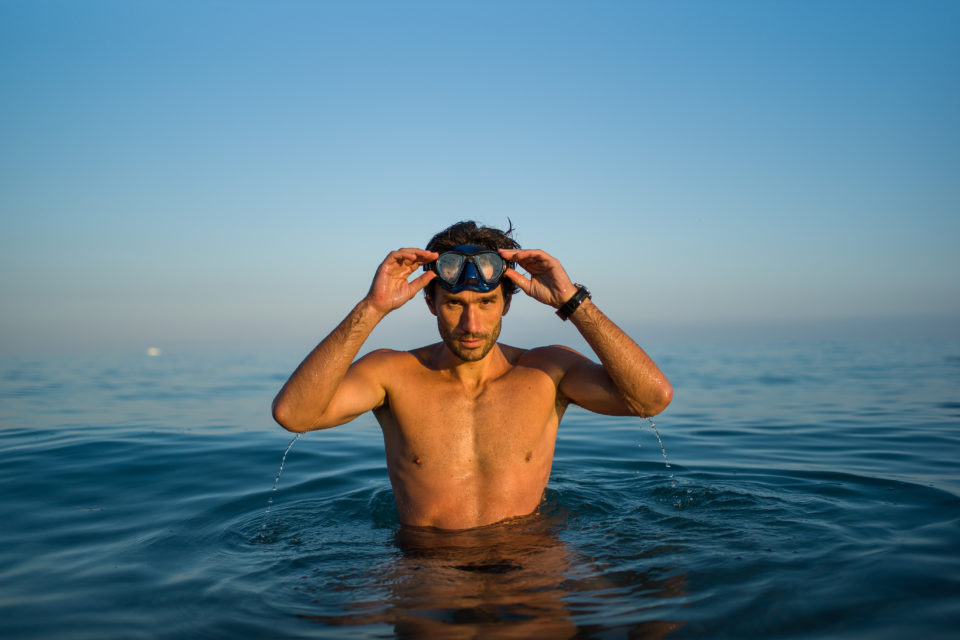A Freedive to Infinity with Guillaume Néry
BWB had the chance to plunge deep into French freediver Guillaume Nery’s grounded sense of self and discover his life philosophies, nature musings, and environmental advocacy.
Somewhere 100 meters below sea level, where shades of teal and seafoam green gingerly plunge into cool tones of deep blue and black, Guillaume Néry finds the center of his body in the vast void of infinity. As a freediver, Guillaume must find ways other than breathing to relax and align his body with his mind. While no longer competing competitively and consistently beating his own world records, Néry continues to share his passion for freediving and apnea with others– as well as a deep concern for the environment and the majestic oceans that provide him such blissful peace.
Considering Guillaume grew up along the lush French Riviera of the Mediterranean Coast and swims in waters across the globe, it comes as no surprise that his outreach extends into environmental and oceanic protection through Longitude 181. In addition to leading a lifestyle that nourishes his body with meaningful physical activity and clean eating, Guillaume advocates for eco-friendly habits and small-scale sustainability. BWB had the chance to plunge deep into Guillaume’s grounded sense of self and discover his life philosophies, nature musings, and environmental advocacy.
Can you share with us one of you first memories linked to the ocean?
I have lots of memories of the ocean since I grew up in Nice, in the South of France. It really started when I got interested in apnea; I was fascinated by exploring the depths and limitations of the human body. I first tried apnea– the breath-holding technique– not far from home, close to the Promenade des Anglais. I remember that all I could think of was going deeper and deeper. What I found most striking was that once I started my descent, I didn’t have anymore visual reference and I found myself confronted with the unknown–infinity. It was an adventure. I left the surface and I didn’t know where I was going. I had this feeling like I was traveling through space. This was a decisive moment in my journey. Since then, I have pursued my quest for the unknown. Whenever I dive today, I try to relive this experience and link my diving to this very first sensation.
What I found the most striking was that once I started my descent, I didn’t have anymore visual reference and I found myself confronted with the unknown–infinity.
What kind of routine do you have to keep in shape (exercise, nutrition, sleep…)?
To practice apnea, you need to be very aware of your body and connect fully with it; you need to be in perfect harmony with yourself. In the morning after I wake up, I drink a large glass of hot water (half a liter). I started doing this a few years ago. It’s a practice that is very common in China. You start the day with a kind of clean-up. Since body temperature is about 97 degrees Fahrenheit (37 Celsius), hot water doesn’t shock the organism.
Through my yoga practice, I have incorporated stretching moves. Every morning, I do a few stretch poses– Sun Salutation being one of them. I do it several times; I prefer to do it for 10 minutes every morning rather than one hour per week.
I have a balanced and bio-diet– mostly local produce and seasonal foods. I eat a lot of fruits and vegetables. I also take some supplements like Spirulina, an algae that is very rich in vitamins and iron. It became a routine. I added it to my diet and I always make sure to pack some when I travel.
Hydration is essential. Water is the key to a healthy and balanced body. I don’t buy plastic water bottles; I have a reusable bottle that I carry everywhere.
As far as sleep is concerned and since I have been living in Polynesia, I go to bed very early and I also get up early. I feel much better and in better health. I am on a different cycle; I get up at 5:30 am and I go to bed at 8:30 pm. I read in the evening and I try to avoid looking at screens. It’s a good formula. I try to live according to the rhythm of nature.
In an urban environment, we lose touch with nature and its rhythm.
I train every day and it has become a way of life; I swim, dive, or go paddle-boarding. I also take walks or go for runs. Very simple activities. I try to avoid technology and using machines. This routine is not only a discipline for the body and the mind; it is also highly enjoyable. These are the basics to feeling good and being healthy.

What are your most treasured memories or the most extraordinary places you have been to ?
I have been lucky enough to experience the most incredible adventures. I recently got to swim with whales; to sense a form of communication with them is incredible. I’ve swum and played with dolphins in Japan. I’ve also been dropped in the middle of a school of bottle-neck sharks at a depth of 15 meters.
However, the most extraordinary experience can also be the most simple one, and it doesn’t mean going to the most exotic locations. I was in Nice. I always have a swimsuit and snorkeling equipment in my backpack, just in case I want to go for a swim. It is my preferred way to recharge my batteries, rain or shine. At the end of May, the water was cool and I felt like going for a swim. I got in the water and went for a four-minute apnea dive.
The way I do it is to grab a heavy rock in each hand and start walking with the rocks in my hands, allowing me to stay at the bottom of the sea floor. The color of the water was beautiful. It was spring; there was a very relaxed atmosphere around me and I felt extremely well. I didn’t feel the need to breathe at all. I swam in a way that felt like flying. I felt as though I’d never need to breathe again! It was a sensation of harmony–perfection–as if I had been totally transformed. I felt like a sea creature, a hybrid human being. This was a unique and incredible apnea experience–some sort of magical moment where everything aligned and worked perfectly. The lesson I learned from this experience is that happiness doesn’t depend on how far you travel; you may find it close to home.
Do you have a message you would like to share?
I have several messages because I am an activist and a militant when it comes to defending our beautiful planet. At the same time, I don’t want to sound like I am preaching because I am not without fault, unfortunately. The way I travel doesn’t really help reduce my carbon footprint. Nevertheless, I try my best to find ways to address this on a daily basis and see what impact my actions have on the environment.
In our western civilization, we have lost touch with nature and we have also lost our connection to the environment. I have made a few adjustments in my daily life: I don’t travel by plane for short trips anymore; I try to go by train or use public transportation systems. It sounds trivial but it is more complicated than it seems, sometimes more costly, and it also marginalizes you. I invite everybody to pay attention to their daily life and be mindful about it. It is not only about turning the faucet off when you brush your teeth; it is more about a new way of life. Question your actions. See what impact they might have, and decide whether or not it is important and worth changing.
In your daily life, what do you do to protect the environment? What do you wish people would do in general?
Reduce traffic.
Eat local, bio, and in season. Avoid shopping in large supermarkets; try the local food stores.
I still have a long way to go but I try to improve every day. When this kind of action becomes a mass effort, we will see a global change.
Think about plastic; it is a disaster for the planet. I try to limit my use of plastic as much as I can. I try not to use plastic forks and spoons, for example; I have chopsticks and silverware, as well as a reusable bottle for water. Once you start doing this, you get used to it in no time. Also, ban plastic bags and plastic bottles. Maybe one day, we might be able to stop asphyxiating the ocean with plastic.
The oceans are endangered today. Can you recommend an organization worth looking at if one wants to do something to protect the oceans?
I belong to an organization that works toward protecting the oceans called Longitude 181.
I am also inspired by the Low-Tech Lab foundation created by Corentin de Chatelperron (a collaborative research and documentation project aiming to share and promote low technologies). The program’s function is to spread local and efficient low-tech solutions in order to provide a global answer to the United Nations’ Sustainable Development Goals. Corentin sailed around the world in a boat that was customized with jute fiber– a natural, local resource in Bangladesh. He is an engineer who promotes local inventions, attempting to make them known and adopted on a larger scale. Today, there are so many engineers who try to implement local solutions for recycling trash, plastic, etc… It is an extraordinary initiative and you can find out how to support it on their website. I admire it greatly.
Photography owned by NERYBLUE

Teresa Deely is a graduate from Columbia University with majors in English and Creative Writing. She is a freelance writer and marketing assistant working for clients in the wellness, jewelry, creative, and sports industries. She believes that one’s skin is yet another canvas and vehicle for art, and has loved styling her hair and applying makeup from a young age. Spending much of her time in educating youth and leading enrichment programs for children, she is highly motivated in discovering new ways to care for herself and sharing them with others.






